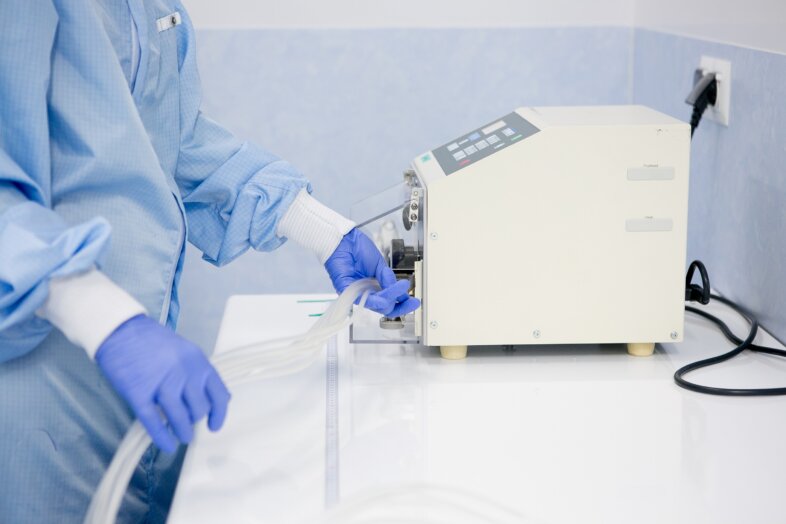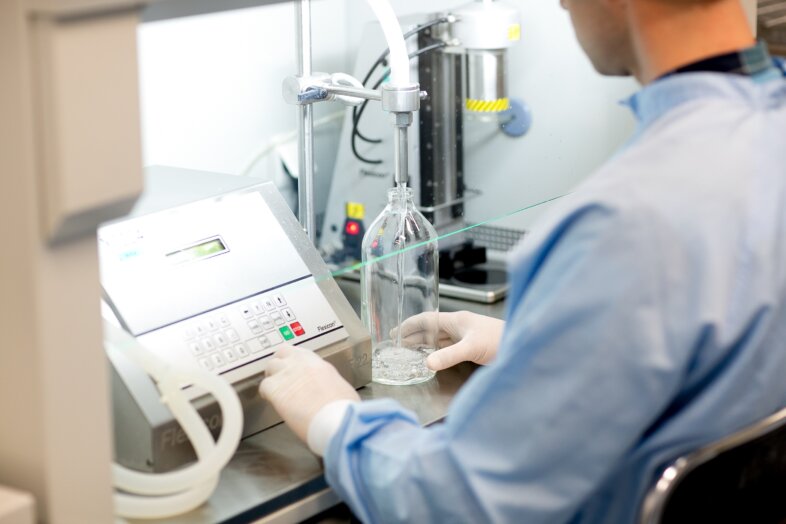
In a dynamic business environment, the Polish branch of a Swedish company Nolato (a developer and manufacturer of products in polymer materials) faced operational inefficiencies due to outdated systems and manual processes. With the decision to implement IFS as their ERP system, the team aimed to enhance efficiency and streamline operations. This case study illustrates the challenges encountered, the solutions devised, and the overall impact of the ERP implementation, drawing insights from Novacura’s team members Andrzej Sałęga-Starzecki, Adam Szlembarski, Dorota Kopacka, and Patrycja Kowalska, who were responsible for the implementation. Additionally, notes from the customer side are included to provide deeper context and for the presented material.
BACKGROUND: THE COMPANY AND ITS CHALLENGES
The Polish branch of Nolato was facing challenges due to reliance on outdated methodologies, primarily using local legacy systems, Excel sheets, and manual processes. Recognizing the pressing need for modernization, they decided in 2022 to move forward with an IFS ERP implementation. Due to corporate requirements, the group implemented version 9 of the IFS system, with plans to upgrade to IFS Cloud in the future.
The execution of this ERP system modernization was complex, requiring strategic planning and specialized expertise. Initial attempts to implement IFS in 2022 were unsuccessful, leading Nolato to engage Novacura as their IFS implementation partner.
Key challenges included:
- Assembling a capable team familiar with IFS 9, suited to the specific needs of the Polish division.
- Configuring essential features like tax compliance and local reporting standards, requiring support from experienced consultants.
- Addressing compatibility issues between IFS 9 and the company’s manual processes, which relied heavily on physical records.
With guidance from Novacura’s team in Stargard, Nolato successfully completed the project, setting the stage for future IFS upgrades and migrations.

PROBLEM ANALYSIS AND PROPOSED SOLUTIONS
The project kicked off in the second half of 2023, with the goal of completing it by year-end (the go-live phase occurred in June 2024).
At the beginning, the project encountered a few problems, such as accessing an IFS support team proficient in IFS9, which was no longer supported by IFS, and correcting the previous Polish extension to IFS.
Nolato had already tried to implement IFS in 2022 without major success.
A significant challenge during the implementation process was also a data migration from an outdated, local database developed by a Szczecin-based company.
The opening balance and initial data import were not problematic; however, preparing the data for migration proved to be more complex. The previous database used different terminologies, which required extensive training and clarification for the clients to understand the new IFS system's requirements. Our consultancy team worked with Nolato, guiding them through the necessary adjustments.
This hands-on approach ensured that the client’s team was well-equipped to handle the transition, which was also confirmed by the positive feedback from the Nolato side:


Katarzyna Gil, Supply Chain Director at Nolato Stargard
The implementation team adopted a methodology that focused on understanding the client’s specific business processes rather than solely relying on the IFS 9’s predefined functionalities. This involved analyzing existing processes and then determining how the ERP system could enhance efficiency without forcing unnecessary changes. The goal was to create a long-term development path, ensuring that the ERP system remained relevant and useful for years to come.
The implementation of IFS 9 encompassed several modules, including finance, warehouse, purchasing, sales, and production.
In total, the implementation spanned various areas of the business, enabling the company to become compatible with other group entities and paving the way for a future upgrade to the IFS Cloud system.

IMPLEMENTATION, RESULTS AND OUTCOMES
KEY FEATURES AND FUNCTIONALITIES
The new ERP system encompassed multiple modules, finance, warehouse, purchasing, sales, and production. The integration facilitated significant efficiencies by reducing manual data entry, enabling seamless information flow across departments. The financial team noted a reduction in paperwork and an increase in automation, leading to considerable time savings and improved accuracy in operations. It also helped to align the Polish branch with the entire Nolato Group.
Patrycja Kowalska (Solution Manager at Novacura) highlighted how the centralized system enhanced the financial department’s workflow, allowing for daily monitoring and real-time updates on key business metrics. This capability enabled timely decision-making, shifting the team away from the limitations of end-of-month reporting.
IMMEDIATE BENEFITS REALIZED
The implementation yielded immediate benefits, including streamlined processes and a reduction in manual workloads. Employees felt relieved as the system automated repetitive tasks, and even though the finance team faced increased workloads due to staffing challenges, the overall efficiency of the new ERP system improved morale and productivity.
Adam Szlembarski noted that the integration minimized the need for excessive paper documentation, resulting in a cleaner, more organized approach to data management. Furthermore, the team reported a positive shift in mindset as employees embraced the new system’s capabilities, feeling empowered rather than overwhelmed.
LOOKING FORWARD: FUTURE ENHANCEMENTS AND FLEXIBILITY
As Andrzej mentioned:
As the implementation progressed, the client recognized the need for enhanced warehouse management capabilities. They faced challenges with manual inventory tracking, which led to errors and inefficiencies. The team suggested transitioning to electronic documentation to streamline operations.
Given their extensive experience with adaptable solutions, the Novacura’s implementation team proposed utilizing low-cost smartphones initially, with plans to upgrade to more sophisticated barcode scanners later. This approach not only improved efficiency but also minimized the need for retraining staff, as the same software could be used across devices.
ONGOING SUPPORT AND FUTURE ENHANCEMENTS
Post-implementation, the team continues to provide support via email and phone, ensuring that the client had access to expert assistance as they navigated the new system. Despite the reduced need for consultations, the client appreciated having resources available for complex tasks such as month-end closing processes.
SUMMARY
The Polish branch of Nolato, an international company focused on the design and manufacturing of cutting-edge polymer-based products, particularly in the pharmaceutical and medical technology field – faced operational inefficiencies due to outdated systems and manual processes. To modernize, the company decided to implement the IFS 9 ERP system and invited Novacurad to manage the entire process.
Initially reliant on an outdated ERP and manual processes, Nolato aimed to upgrade to IFS version 9 in 2022. However, challenges in team assembly and data migration led Novacura to step in and support the project.
Launched in the second half of 2023 and successfully going live in mid-2024, the implementation included finance, warehouse, purchasing, sales, and production modules, enhancing efficiency and data accuracy. Employees benefited from reduced manual workloads, resulting in improved morale and productivity. Post-implementation, ongoing support was provided to ensure a smooth transition.
The entire process was positively evaluated by the Nolato team, who noted that the process began with a strong recommendation from the Swedish branch to work with Novacura: Positive feedback from our colleagues in sister companies within the Nolato Group helped us decide to entrust the task of implementing IFS to the Polish branch of Novacura. Clear, fast, and open communication, focused on understanding our needs from the initial proposal stage, confirmed our decision to move forward with the implementation together, highlighted Katarzyna Gil from Nolato Stargard.
ABOUT NOLATO
Nolato is a global provider specializing in the development and production of advanced polymer-based products, with a strong emphasis on the pharmaceutical and medical technology sectors. Their offering includes everything from concept development and product design to large-scale manufacturing, post-processing, and logistics. By collaborating closely with customers early in the process, Nolato helps create innovative, sustainable, and cost-efficient products ready for manufacturing.
ABOUT NOVACURA
As a Channel Partner to IFS since 2018, Novacura offers a comprehensive range of services for IFS, including implementation, upgrades, enhancements, integration, training, and audits. Additionally, Novacura provides a low-code platform, Novacura Flow, enhancing flexibility of IFS platform.
Novacura is honored as a Gold Channel Partner in the Nordics, receiving the prestigious “Channel Partner Awards” three times consecutively in 2017, 2019, and 2022.
Contact us today to learn how Novacura can support your IFS ERP for finance and supply chain operations, streamline manufacturing processes, and drive your company’s digital transformation in manufacturing.





